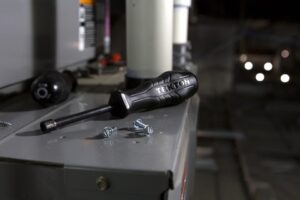
Our recommendation is to regularly make sure that your HVAC unit is operating in tip-top shape. Regular maintenance extends the life of an air conditioning system, but when is it time to upgrade? How can you tell when it’s passed its prime?
The answers depend on the age of the HVAC unit and the overall condition of the system. Generally, a quality HVAC unit has a lifespan of about ten to 15 years if you follow a proper maintenance schedule.
But knowing when to get a new HVAC unit is tricky, so to help you make an informed choice, here’s how you can tell when it’s time for an upgrade.
1 – You Hear Loud, Odd Noises Coming from the Unit
When to upgrade an HVAC unit varies from situation to situation. Climate has a lot to do with how much wear and tear an HVAC unit endures. In the summer months in the Southwest United States, homes run their air conditioner 24 hours a day for several months. One of the most common ways to tell it’s time for an upgrade is when you hear loud, odd noises coming from the unit. HVAC units are noisy in general, but they should never emit grinding, scraping, or rattling noises that indicate loose or failing components.
2 – Your HVAC Unit Consistently Loses Coolant
It’s common for HVAC units to get small leaks in the coolant lines. Eventually, the coolant will run out and need replacing, which is standard maintenance. We have seen HVAC units that are relatively new but lose coolant faster than usual. This situation almost always points to faulty components and the need to replace or upgrade the system. Refilling coolant should only be a stopgap measure if it consistently is running out.
3 – The Air Quality in Your Home Declines
When it’s running well, your HVAC unit provides ventilation throughout the home. We often take this for granted until our air conditioner breaks, and the air stagnates in the house. HVACs are not only for cooling or heating the home; HVACs also keep humidity low and help filter allergens and pollutants. That’s why you have to replace the filter regularly.
An aging HVAC unit won’t push air as powerfully as it needs to move it. What happens is that low airflow makes the home dusty, stuffy, and more humid than usual. If you suffer from allergies, worsening flare-ups despite taking more medication could mean your HVAC unit is running very poorly and in need of upgrading or replacing.
What Does the Average HVAC Upgrade Cost?
The price you pay genuinely depends on many factors, including the cost of energy in your community. In our experience, many homeowners choose to upgrade their HVAC unit precisely because of rising energy costs. A more efficient air conditioning system costs less over the long run in addition to cooling the home for years to come.
Contact us to learn more about HVAC unit upgrades or additional services we provide. We strive to give our customers a range of options and never push the most expensive fix when a simple one will do.

